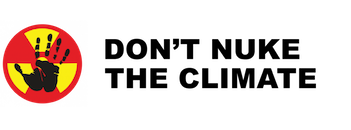PR:International Camp To Gather Forces To Stop Atomic Business
Project Atomic Threats In The Baltic Sea Region - call out - timeline - book - Nuclear Baltic Map
media group - planning meeting - working meetings - updating internet conferences - coordination - finances
Media Release
Monday, February 24, 2014
- For immediate release -
Anti-nuclear networks arising around the Baltic Sea:
International Camp To Gather Forces To Stop Atomic Business
KIEL / BALTIC SEA - Anti-nuclear activists will gather in August 2014 to strengthen struggles against dangerous nuclear developments around the Baltic Sea.
From August 9-16, activists and interested members of the public are invited to an international summer camp near Kiel in northern Germany to learn about atomic threats, share campaigning skills, develop international networks and to prepare and participate in public actions against the nuclear industry.
A similar anti-nuclear camp was successfully held in 2013 in the German Münsterland region, gathering groups and people to campaign against the nuclear waste treatment facilities and repositories in this area.
The camp will be organized by different groups and activists across Germany. The ATOMIC THREATS IN THE BALTIC SEA REGION (ATOMIC BALTIC) network/project invites activists, groups and all interested people around the Baltic Sea to join this international camp to foster struggles to prevent the nuclear industry from continuing to poison the environment and threatening people's lives and health. The camp will be the biggest regional event in 2014 to build campaigns and support projects all over the watershed of the Baltic Sea.
Transports of nuclear material - uranium, waste, fuel, etc. - across the Baltic Sea will be one topical focus of the international camp. Near the camp, for instance, shipments of uranium heading to Hamburg are passing the Kiel Canal on their way to enrichment and fuel fabrication plants in Germany and the Netherlands. These transports will be in the focus of public direct actions to show people's commitment to stop the threats they pose to everyone living near the routes or in the destination areas.
Water makes the communities in the watershed of the Baltic Sea close neighbours - even though some of them are more than 1,000 kilometers away. Seven countries are affected: Denmark, Sweden, Finland, Estonia, Latvia, Lithuania and Poland. In addition, Russia, Germany and Belarus partly share the Baltic Sea watershed. The Baltic Sea is not only important as food source for millions of people, but also an important recreation area for many more - and it is a transport medium for poisonous emissions from more than 60 atomic facilities discharging pollutants to water and air. Thus, the Baltic Sea is connecting needs and interests of human populations of a wide area forming an unique community.
"The nuclear industry operates internationally, so if we want to stop them, citizen's movements have to work internationally, too," says activist Hanna Poddig from Germany. "An internationalization of resistance means to know from struggles in other countries and to consider our local fights against nuclear threats as part of an international community of concerned people." Thus, new campaigns and networks should be established by people from different countries and encompass interrelated anti-nuclear projects as well as connecting to other social movements.
Undemocratic nuclear developments in Poland will be one topic on the camp agenda. Marcin Harembski, head of the Civil Nuclear Monitor, a grass-roots observatory of nuclear policy developments in Poland, says: "The Polish nuclear program has never been subject to meaningful public consultation. All the crucial decisions on entering the nuclear path have already been made by the governmental administration and their other moves aim only at justifying these decisions. That process is neither transparent nor democratic."
"ATOMIC BALTIC" is a network/project of anti-nuclear groups and activists in the Baltic Sea watershed including also organizations supporting with their knowledge, experiences and networks from Austria and the Netherlands. Its main goal is to strengthen local anti-nuclear struggles around the Baltic Sea by connecting activists, starting up new initiatives and supporting campaigns against the nuclear business. The ATOMIC BALTIC network/project provides a platform for exchange including internet tools, continuous Skype conferences and bimonthly working meetings.
Detailed information on ATOMIC BALTIC and the international summer camp as well as updates are available online:
Interested people are invited to join the next ATOMIC BALTIC working meeting in Döbeln, Germany on March 3-9, 2014, and to apply for participation by e-mail to atomicbaltic AT nuclear-heritage DOT net[1].
Notes to Journalists and Editors:
You are welcome to contact us, if you have questions, for interviews, background information and to request photo material on anti-nuclear actions in the Baltic Sea region via landline phone +49 3431 5894177 or e-mail to media AT nuclear-heritage DOT net[1]. You can also the website:
Media contacts:
- Hanna Poddig, Germany
+49 175 9767027, hanna AT contratom DOT de[1] - Kristine Ceirane, Latvia
kristin AT nuclear-heritage DOT net[1] - Marcin Harembski, Poland
translocal AT o2 DOT pl[1]
Nuclear Heritage Network
Am Bärental 6
D-04720 Döbeln
GERMANY
website: http://nuclear-heritage.net
email: contact AT nuclear-heritage DOT net[1]
phone: +49 3431 5894177
Skype: projekthaus.mannsdorf
(available only during office hours)
Jabber/XMPP: network.office - domain: jabber.ccc.de
(available only during office hours)
opening hours: Wednesdays at 2-4 PM CET
This media release has been provided by the "Nuclear Heritage Network". It is an international network of anti-nuclear activists. This informal alliance supports the worldwide anti-nuclear work. The Nuclear Heritage Network is no label, has no standard opinion and no representatives. All activists of the network speak for themselves or for the groups they represent.

